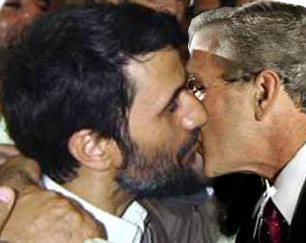
S.W.A.K.
Mahmoud and Shrub, sitting in a tree:
The US-led "war on terror" has bolstered Iran's power and influence in the Middle East, especially over its neighbour and former enemy Iraq, a thinktank said today.
A report (.pdf) published by Chatham House said the wars in Iraq and Afghanistan had removed Iran's main rival regimes in the region.
Israel's conflict with the Palestinians and its invasion of Lebanon had also put Iran "in a position of considerable strength" in the Middle East, said the thinktank...
In particular, Iran has now superseded the US as the most influential power in Iraq, regarding its former adversary as its "own backyard". It is also a "prominent presence" in its other war-torn neighbour, Afghanistan, according to Chatham House's analysts.
The report said: "There is little doubt that Iran has been the chief beneficiary of the war on terror in the Middle East.
"The United States, with coalition support, has eliminated two of Iran's regional rival governments - the Taliban in Afghanistan in November 2001 and Saddam Hussein's regime in Iraq in April 2003 - but has failed to replace either with coherent and stable political structures."
The thinktank said the west needed to understand better Iran's links with its neighbours to see why the country felt able "to resist Western pressure".
"The US-driven agenda for confronting Iran is severely compromised by the confident ease with which Iran sits in its region," said the report.
Western countries, led by the US, are locked in a bitter dispute with Iran over its nuclear programme.
Iran, the world's fourth largest oil exporter, says it will not give up what it says is its right to peaceful nuclear technology. The west suspects Tehran is developing nuclear weapons.
The thinktank said: "While the US and Europeans slowly grind the nuclear issue through the mills of the International Atomic Energy Agency and the United Nations security council, Iran continues to prevaricate, feeling confident of victory as conditions turn ever more in its favour."
The report added the country was "simply too important - for political, economic, cultural, religions and military reasons - to be treated lightly".
One of the report's authors, Dr Ali Ansari, reader in modern history at the University of St Andrews, told Radio 4: "The United States needs to take a step back and reassess its entire policy towards Iran and work out, first of all, what does it want and how is it going to achieve it, because at the moment everything is rather like putting a sticking plaster on a fairly raw wound, and it is not really actually doing much at all."
Team Bush makes the Keystone Kops look like Hawaii Five-0.
No comments:
Post a Comment